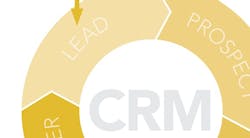CRM Systems: How a Good One Can Strengthen Sales
In your quest to increase revenue while reducing costs, it’s essential to know the important numbers. But capturing and analyzing those numbers can’t be done in any meaningful way unless you have an industry-specific CRM, or customer relationship management tool.
A CRM system will help you maximize sales revenue and profit in a number of ways. Unfortunately, there are many reasons why builders and sales organizations don’t take the important step of implementing a CRM. Maybe the sales team isn’t willing to use it; perhaps it’s that a contact management system (CMS), such as MS Outlook, is good enough; or it could be the mistaken idea that a CRM is just another expense that doesn’t provide value.
CRM vs. CMS
Without a CRM, though, you won’t know how many sales and how much revenue and profit you’re missing, and why you’re missing it. Erik Cofield, an expert at helping builders use customer relationship management systems, says that the first step is to understand the difference between a CMS and a CRM.
While a CMS stores contact information, some notes, and history, it doesn’t give the salesperson or the company the necessary tools to manage the relationship and action items, such as marketing automation and email marketing.
A CRM, on the other hand, allows complete tracking and management of leads, prospects, contacts, and customers. Most importantly, a CRM enables moving a shopper to being a prospect, and then moving the prospect to being a customer. It can even be used to manage post-sale activity.
In-Depth Sales Management
A builder-specific CRM is a robust management tool, enabling consistent, trackable management of the entire customer life cycle. It affords the builder tremendous benefits, which include automation of tasks, insight into metrics, and tools to get the right message out at the right time based on contacts, actions, and stage of engagement. In a competitive market, a CRM provides a powerful opportunity to take market share from competitors by being able to sell more homes and sell them faster.
Choosing the CRM system that’s best for you is like buying a computer, truck, or phone system. There’s no one size that fits all. You need to know what you want the CRM to do, and then compare your options.
The sophistication of the CRM you choose—along with its ease of use and your ability to leverage it—will determine how much market share you can take. So will your skill in marketing, marketing automation, follow-up campaigns, and other marketing techniques. There’s always a measurable return on investment when the right system is used appropriately, effectively, and efficiently.
Here’s how to get the best results from your CRM:
- Make sure that leaders are first-adopters. This way, sales teams will follow suit.
- Base prospect rating codes (A, B, C or more advanced options) on actual data. Don’t simply rely on what a salesperson intuits about a potential customer. An extraordinary CRM system will give you the chance to use data.
- Create, implement, manage, and measure follow-up campaigns for each stage and type of contact. This is essential. For example, a new Web lead, new walk-in lead, or someone who toured a model; each require different motivational language and a specific type of follow-up.
- Make technology work for you. Campaigns must be set to run whether the salesperson logs in or not.
- Build in accountability. Campaigns should also include tasks for sales staff as reminders, timed accordingly.
- Make the CRM accessible anytime, anywhere. Web-based systems allow use on a home computer, work computer, tablet, smartphone, or laptop. Real-time data lets you make real-time decisions and take real-time actions such as rapid response, price negotiations, and more.
A Salesperson's Best Friend
A CRM will help a salesperson go from inexperienced to good, good to great, and from great to extraordinary—quickly. When a CRM is used consistently and effectively, your salespeople will see results. In turn, they’ll invest focused time and effort with interested, qualified prospects, rather than shot-gunning with those who are not.
A CRM isn’t overhead—it’s an investment with a qualified and quantifiable return on investment (ROI). While a great CRM doesn’t cost much, a bad CRM can cost an untold amount of lost sales, revenue, and profit—one of many silent profit leaks. Some CRM systems are free, and they’re still not worth it. On the other hand, some are so expensive that they seem like a bad joke.
Finally, don’t waste time with a generic system that will demand many hours customizing and outfitting the CRM to suit your needs. Ask these questions when choosing a CRM:
- Is it designed for the residential construction industry?
- Have the templates, reports, and appropriate fields been time-tested to capture important information?
- Does it provide workflow and process as a part of the software?
- Does it allow for follow-up campaigns, marketing automation, scripts, and templates?
- Is the price tag moderate, so that a sales agent can buy the software if the company won’t?
Applying Cofield’s concepts, a fully functional CRM system will enable sales and marketing to know:
- Where leads come from
- Which marketing campaigns work
- Marketing cost per lead and per home sold
- Expected revenue and closing ratios per traffic source
- How to use analytics for a consistent marketing message
- How to budget wisely
Erik Cofield, CGA, is a partner at BuilderTech Consulting and can be reached at [email protected].

